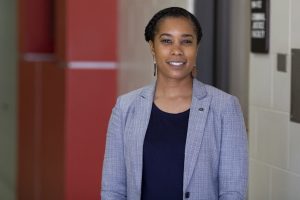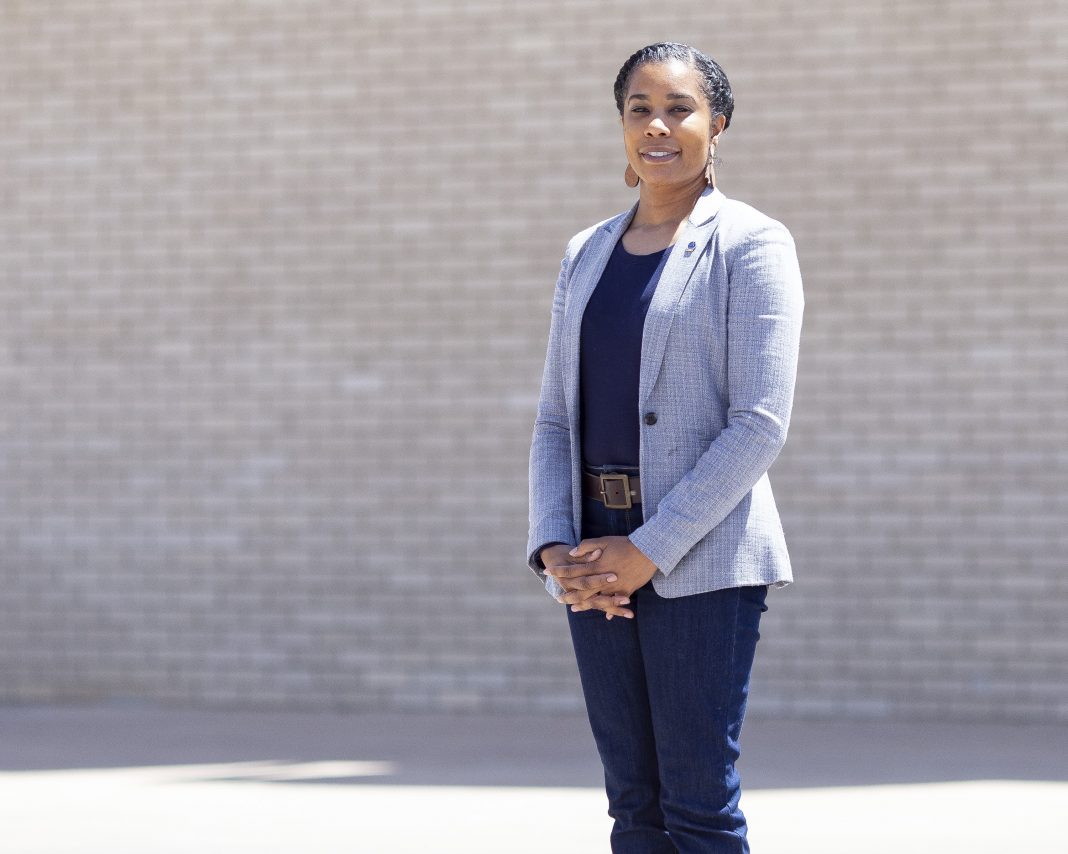Odessa College’s own Nikki Brown is part of a documentary called “A Celebration of Women’s History Month.”
Brown, who is training coordinator/director of the OC Law Enforcement Training Academy and on its faculty, said the documentary was made by a company called Monumental Access out of the St. Louis area. It doesn’t yet have a name.
Brown said she was familiar with the company.
“I had been in the the public safety industry. That’s how we know of one another and know each other — from public safety,” she said.
Being asked to be part of the film, she said, was very humbling.
Sometimes you don’t think others take note or care about your experiences.
“So to be asked to participate was one of those humbling moments that oh someone believes I’m interesting enough to share with … a broader audience,” Brown said.
Brown said she was asked about her experiences in public safety, how she got her start and her motivation for going into law enforcement and/or the public safety sector.
She said she also was asked to share some of her current experiences and how they related to prior law enforcement experiences and some of her aspirations for the future.
“I have a small clip, roughly three minutes, a little bit less than three minutes that’s already viewable on YouTube. My understanding is when the entire production is finished, it will be rolled out to multiple media platforms, including YouTube and other media outlets. The company has other experiences with public safety, so this isn’t just one documentary. They’ve done others,” she said.
She said they talked to her for an hour or a little bit longer and videoed some content downtown.
Brown said she briefly touched on the fact that the public safety sector, especially law enforcement, is a heavily male dominated field.
“You work through the challenges and barriers and hopefully inspire other females or other populations who are interested in joining public safety,” Brown said.
She added that the number of women in law enforcement is increasing.
“The percentages are growing compared to maybe 20, 30 years ago. If you look at even in this West Texas area, the chief on campus (at OC) is a female. You also have the chief of Pecos, who is a female. So we’re now seeing more departments and agencies that are led by female … leaders,” Brown said.
She added that she hopes being in the documentary will help draw people to OC’s Law Enforcement Academy. One of the ultimate goals is to let people know the academy is up and running and welcoming applicants.
Monte Chambers, founder-CEO of Monumental Access, said the production is still ongoing.
Chambers said he chose Brown because of her background in law enforcement and becoming director of the OC training academy.
“There are so many different moving parts with her story,” Chambers said.
He added that there would be several women in the documentary from a variety of backgrounds who have served in different roles and capacities that have reached some true milestones in their respective industries.
The documentary will come out around the fall and be available on YouTube.
Chambers said he knows Brown from working with her at the St. Louis County Police Department.
He added that it was great to see her again and see the progress she has made in professional law enforcement.
“It’s just mind blowing when you hear her background and her story. She has a heck of a story for sure,” Chambers said.
It could also inspire people who see Brown and realize they can do it too.

The academy’s most current class graduated in January, so they are preparing for the class that will start this year.
“We’ve got seven that have passed the background. We’re waiting for board interviews. We’ve got approximately four more that we’re waiting on some type of paperwork so we can get them started with their background and then put them on for the board and try to do our board interviews one day, because it’s sometimes a challenge to get board members together so we can have one day (at) set times and get everybody through to determine who’s approved for the academy and who’s not,” Brown said.
There are 10 people on the board.
“We have several chiefs who are on the board. We also have a member of DJI, which is a prominent drone company. We have community … members to give the community aspect of what they desire, what they want to see from law enforcement. We try to make the board diverse where it’s not just hearing from other law enforcement personnel, but hearing from other people who will be either impacted from the community sense, or … who could collaborate with law enforcement training,” said Brown, who started the job in March 2020.
The goal for the academy moving forward is to have at least two full-time classes, which are approximately six months, and one part-time class, which takes approximately 10 months.
Many of the instructors are adjuncts.
“They’re able to teach continuing education classes if and when they have time. We have the flexibility that if someone comes to me and says, Hey, I want to teach a criminal investigation class, and they already have their lesson plan, or need help with lesson plans, we can get a … form. They can either teach it here on campus. Monahans officers’ preference is to teach at our offsite campus in Monahans …,” Brown said.
The Texas Commission on Law Enforcement classes are created for all criminal justice personnel.
“We’ve had individuals from the courts. We’ve had individuals who are with sheriff’s offices. We’ve had individuals that work for the city. If they’re interested in the TCOLE classes, like our basic instructor class, our advanced instructor class, it’s not just isolated to law enforcement,” she added.
Brown started in 2006 with the Illinois State Police, but failed the firearms, so they put her out of the academy. But she met officers from St. Louis County who encouraged her and worked with her to go back to the academy.
With their support, Brown went through the academy in 2008 in St. Louis County in Missouri.
“I was the only black female. It was different. What I will say is the females came together. It was, I believe, five or six of us in a class of over 20 …,” Brown said.
She got into law enforcement because she had a bad experience in graduate school.
“I wasn’t taught to dislike police … But when I got in grad school, I was pulled over and the traffic stop was pretty horrifying. And I quite frankly didn’t like police after that. So I spoke to my thesis chair, who was married to a prosecutor at the time, he helped walk me through the ticket process and helped with not having to pay the $300 that those tickets would have been. And I did get an internship with the city of Murfreesboro, Tennessee, police department where I got to sit down and ask questions to officers of all ranks, colors, genders, and they helped fill in those gaps from the traffic stop to really seeing officers in a different light,” she said.
“And one summer while I was in grad school after that stop, I visited home in O’Fallon, Illinois, and talked to the chief at the time and shared with him my experience and asked him questions and I didn’t know later on I would work for that department, but even the chief just taking the time to talk to a college student meant the world. It meant a lot, all of that shaped my research, was my thesis. And ultimately I said, you know, I want to be a police officer. I knew I wouldn’t stay 30 years, that wasn’t my intended goal. But I knew for however long I was purposed to be in law enforcement that if nothing more than eight hours, 10 hours, 12 hours, depending on my shift, if no one else has to feel what I felt on that traffic stop then my purpose has been served …,” all her academy training was worth it, she added.
Brown earned her bachelor’s degree in criminal justice from Lane College in Jackson, Tenn., her master’s in criminal justice administration from Middle Tennessee State University and Tennessee State University, which was a dual master’s program at the time, so she took hours at both schools.
Her doctorate is in higher education leadership from Maryville University in St. Louis.




